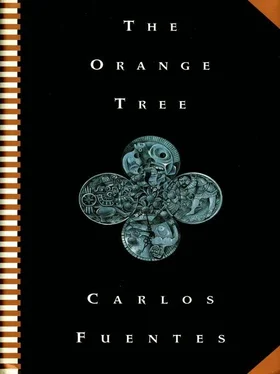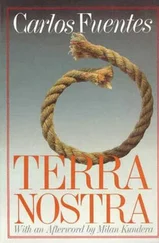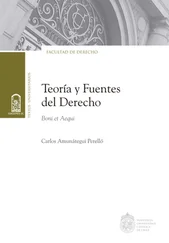THE TWO MARTÍNS
What has my brother come to say to me? That there is no higher authority in New Spain than I myself? That I only want to enjoy my wealth and show it off to others as I do, in toasts and masquerades, soirees and baptisms, processions and entertainments? Has he come to remind me that I am the firstborn by right of inheritance, the heir of the entailed estate of a humiliated father who depends on me to do what he wished to do but couldn’t? I, greater than my father? I, superior to Hernán Cortés, Conqueror of Mexico? I, capable of doing what my father did not do? Rebel? Rebel and take over the land? Revolt? Revolt against the King?
My brother says he’s gone to the tomb of his Indian mother, a flooded grave near Ixtapalapa, moist but surrounded by nervous flowers and floating plots of land. He’s gone to that tomb and told his mother, Malinche, that thanks to her my father conquered this land. He comes to me to ask if I’m less than his Indian mother. He offends me. He riles me up. He shits on me, as he says himself. He starts talking a language I don’t recognize. But he uses it well, with malice and temptation. Because if he talks to his mother, I can’t talk to mine, Doña Juana de Zúñiga, walled up in her Cuernavaca palace, surrounded by ravines, constables, and watchdogs. She denies me access to my inheritance — well, to a part of it.
My brother, on the other hand, speaks directly to his mother and tells me he says this to her: Dear Mother Malinche, what more would I want than to be king of this land. But look at me, dark and with averted eyes, what the hell do you want me to be? On the other hand, my brother is as beautiful as the sun, an all-powerful marquis, coddled by fortune, and yet he will not dare, will not dare. He’s afraid of taking over the land. The land. Yesterday I brought him (my brother the mestizo brought me) to the highest point on Chapultepec, and there I showed him (he showed me) the beauty of this Valley of Mexico.
It was morning, and the cool air announced a hot day. We both knew that the dawn would smell of roses pearled with dew and ripe fruit, open to pour the secret juices of the papaya, the cherimoya, and the guanabana. The beauty of this valley is that it makes mirages tangible. Distances change thanks to the trickery of mountains and plains. Faraway things seem close, and what’s close seems faraway. The lakes dry up and evaporate, but they still mirror the trees newly born next to them, laurels, pirús, and weeping willows. The century plants reclaim their ancestral dominance over the dust. And the bluish mountains, the volcanoes crowned with white whirlwinds, the hillsides covered with thick forests, the liquid air, the breath of the sun like an oven, the punctual afternoon shower: all that, we two brothers contemplated one morning.
And then one afternoon, he says to me that what counts is power over this land, not over things, not over the inventory that gave my father sleepless nights and that now threatens, Brother, to overwhelm you: the houses, the furniture, the jewels, the vassals, the towns … Be careful: back in Seville you saw the auction of our father’s house, and you feared the conquest of Mexico would end in a junk-shop sale of pots and old mattresses. Be careful. Take the land; forget the things. Do what your father didn’t do. Look at the earth and remember. Hernán Cortés wasn’t the only one to see it for the first time. Many men — soldiers, captains, a few criminals, a few other hidalgos, the majority honorable people from towns in Estremadura and Castile — came over with him. You aren’t alone. Our father was never alone. He triumphed because he kept his ear to the ground and listened to what the land had to say. Don’t be like Moctezuma, who waited to hear the voice of the gods; the gods never spoke to him because they’d already run away. Be like our father. Listen to what the land says.
These arguments were useless in the face of the physical enchantment of this Valley of Mexico. In it, there was room for all climates at the same time: summer and spring, autumn and winter all linked together, as if eternity had decided to meet itself in that transparent air. The shock of that purity engulfed us. And we trembled together, listening to the noise of the city to come, the incessant arguing, the growl of a million tigers, the plaintive howl of hungry wolves, the terror of serpents that revealed a skeleton of metal when they changed their skin. The valley fills with multicolored lights, as bright as the liquid silver of a sword pointing between the eyes of the world, red as a breath exhaled from hell, but all of them overcome by an evil-smelling mist, a foam of gas, as if the valley were a flatulent belly, pitilessly opened by a knife to carry out a premature autopsy. We, the two Martíns, plunge our hands into that open stomach, we smear ourselves with blood up to our elbows, we remove the guts and viscera of Mexico City, and we don’t know how to separate the jewels from the mud, the emeralds from the gallstones, the rubies from the intestinal chancres.
Then, from the bottom of the lagoon, unexpectedly, there surges up a chorus of voices, which at first we two brothers can’t manage to understand … One sings in Nahuatl, another in Castilian, but they end up blending together: one sings the unfolding of the flower-like Quetzal mantles, another the swaying of the Sevillian poplars in the breeze; one begs that the flowers not die, that they last in someone’s hands; another, that the wounded, love-struck crane not die … The voices fuse to sing together in the fleeting passage of life; they wonder if we’ve come in vain, we pass through the earth: we touch the flowers, we touch the fruit, but a loud, disconsolate scream remembers, adding another voice to the group: Within the garden I shall die, within the rose garden shall I be slain, words that fuse with the responsory of the Indian land, No one, no one, no one, in truth, lives in the land: we’ve only come to dream, and the words flow far from the valley, into a distant sea where the silent rivers of life come to a halt; We, says the Nahuatl voice, shall have to go to the place of mystery … And then, as if borne along by a wind that scatters the pestilential smoke and puts out the cruel lights and silences the strident noises, the singing ends without ending:
My flowers will never end,
My songs will never end.
I raise them up,
I am only a singer …
MARTÍN 1
He wants me to forget my existence, my honors and pleasures. He doesn’t realize that those things are enough for me. I have no plan to govern this land. Let the others govern it; the more mediocre they are, the more they will envy me. What’s wrong with that? He thinks I don’t know how to read his arguments. Anyone who lives here understands them. He wants to avenge his mother. He seduces me by convincing me I should avenge my father. Our revenge does not unite us. It goes beyond that. He reminds me that our father ended loving Mexico more than he loved Spain, that he considered Mexico to be his land and wanted to return here to die. Spain, time, papers, and official perversity denied him that wish. Perhaps, my brother alleges, the reason is that the presence of our father in Mexico was feared. The long court trial was in reality an exile. Hernán Cortés wanted to save the Indian temples; the Franciscans stopped him. He wanted to end the system that made the Indians into bound vassals; the commissioners prevented that from happening. In our father’s humanism, the King saw the thing he most feared: the unrestricted government of the conquistadors. Their caprice. Their insolence. For the good of all, the King had to impose his will on the conquistadors — they weren’t to think their deeds gave them the right to govern.
Didn’t Gonzalo Pizarro take up arms against the King in Peru? Didn’t the traitor Lope de Aguirre go deep into the Amazon to found a new kingdom against the King of Spain? Better to corner the conquistadors, surround them, strip them, leave them to die drowned in ink and papers or stabbing each other to death; let Pedro de Mendoza die of hunger and syphilis on the banks of the Río de la Plata; let Francisco Pizarro die assassinated by the supporters of Diego de Almagro, his rival; let Pedro de Alvarado die crushed by a horse; and let our father Hernán Cortés die of rage and despair. Does my brother, the son of the Indian woman, want me to add my name to theirs? Like hell: my resentment is not his, and he does not share my secret. I know my father wanted to free both the land and the vassals. I violated my father’s testament. Let others sing his glory and his humanism — Father Motolinia for example: “Who loved and defended the Indians in this new world as Cortés did?” I base my pride on my modesty. I did not carry out my father’s will in his testament, which was to free this land. How could I possibly reclaim that same freedom now? Especially if it’s going to cost me my toasts, my masquerades, my baptisms, my envies, and my fortune.
Читать дальше












